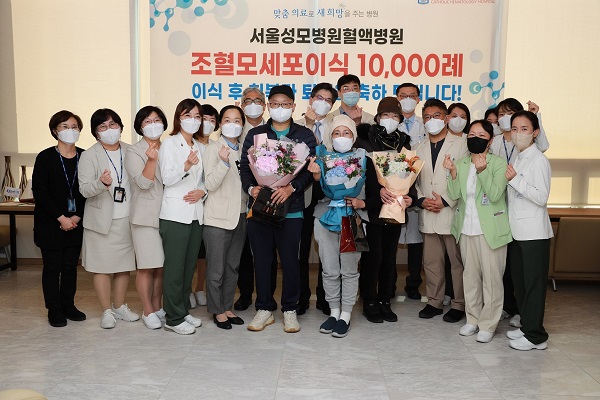hsct market hsct guideline hsct vod South Korea
hsct bmt stem cell therapy korea Disease Patients
Seoul St. Mary's Hospital
South Korea Blood cancers Novartis diagnosis
Allogeneic HSCT CAR-T therapy allogeneic cell therapy
international blood cancer treatment diagnosis

Seoul St. Mary's Hospital Blood Center has once again made history in treating refractory blood cancers. Following the successful first allogeneic HSCT in Korea for acute lymphoblastic leukemia patients in 1983, the center recently achieved another milestone by performing 10,000 HSCTs, the first of its kind in Korea. Particularly noteworthy is that amidst COVID-19, the hospital continued HSCT treatments for blood cancer patients, focusing on refractory blood cancer treatments.
HSCT is a treatment method for leukemia, malignant lymphoma, multiple myeloma, and other blood cancer patients, where high-dose chemotherapy or whole-body irradiation removes the patient's cancer cells, and hematopoietic stem cells are transplanted to regenerate healthy blood cells.
Seoul St. Mary's Hospital, led by Professor Kim Chun-chu in 1983, succeeded in the first allogeneic HSCT in Korea. Since then, they have achieved several other firsts in Korea, including allogeneic bone marrow transplantation (1995), peripheral blood stem cell transplantation (1996), cord blood transplantation (1998), unrelated bone marrow transplantation (2001), and simultaneous liver and HSCT (2002), pioneering high-complexity treatments.
Due to these achievements, the Blood Center has been recognized as the "fourth hospital for blood cancers," as many patients from tertiary medical institutions in Korea and abroad have been referred to it. Approximately 20% of all HSCTs in Korea (21.5% in 2019, 19.7% in 2020, and 18.2% in 2021) are performed at Seoul St. Mary's Hospital.
Notably, allogeneic HSCTs, which are more challenging than autologous transplants, account for 74.2% of all transplants (accumulated total of 7,433 cases as of December 2022: peripheral blood stem cell transplantation 329 cases, half-matched family transplant 1,196 cases, unrelated transplantation 2,508 cases, sibling transplantation 3,400 cases).
Examining by disease, acute myeloid leukemia had the highest number with 3,315 cases, followed by acute lymphoblastic leukemia with 1,796 points, multiple myeloma with 1,286 cases, aplastic anemia with 990 cases, myelodysplastic syndrome with 783 cases, non-Hodgkin lymphoma with 765 cases, chronic myeloid leukemia with 472 cases, myeloproliferative neoplasms with 119 cases, and others with 491 cases. As of 2021, Seoul St. Mary's Hospital accounted for 42.9% (431 cases) of allogeneic hematopoietic stem cell transplants (HSCT) among the top five hospitals in Korea.
Seoul St. Mary's Hospital recently completed a final agreement with Novartis on March 20 to commercialize CAR-T cell therapy, which selectively attacks cancer cells. They are currently conducting trials for the cell immunotherapy drug 'Kymriah.'
CAR-T therapy is a type of advanced cell therapy that combines tumor-killing T cells with a protein called chimeric antigen receptor (CAR), allowing for more potent eradication of tumor cells.
It is gaining attention as an innovative treatment method, particularly for refractory blood cancer patients, due to its selective and potent therapeutic effect targeting only cancer cells.
Kymriah can be used for patients with relapsed/refractory diffuse large B-cell lymphoma (DLBCL) and B-cell acute lymphoblastic leukemia (ALL) under 25 years old who have undergone two or more previous treatments.
Seoul St. Mary's Hospital pioneered the establishment of a necessary facility for cell therapy within university institutions, the Good Manufacturing Practice (GMP) cell processing facility, and has been conducting various studies on immune cell therapy and stem cell utilization using this facility.
Kim Hee-jae, the director of Seoul St. Mary's Hospital, expressed gratitude to everyone who contributed to reaching 10,000 allogeneic hematopoietic stem cell transplants (HSCT) at Seoul St. Mary's Hospital, Catholic Hematology Hospital.
He remarked, "This achievement will be a shining milestone that leads the advancement of advanced transplant medicine in Korea." He further pledged, "We will continue to uphold the spirit of Christ, healing not only the physical but also the emotional pain, and strive to become a world-renowned specialized treatment center for hematologic diseases, delivering greater joy of healing and developing future-oriented cutting-edge medical technology.
The 10,000th recipient, Mr. An Jong-sik (47, male), was transplanted on December 21 last year. Diagnosed with multiple myeloma in May last year, Mr. An underwent autologous hematopoietic stem cell transplantation after induction chemotherapy.
He is currently in a very favorable condition, expecting complete remission after the transplant. Mr. An, who is recovering smoothly, will continue with maintenance therapy and monitor his progress after discharge.
Dr. Min Chang-ki, the attending physician, emphasized the importance of autologous hematopoietic stem cell transplantation as a primary standard treatment for multiple myeloma, noting significant improvements in treatment outcomes with new drugs before and after transplantation. He emphasized the hospital's pride in leading hematologic hospitals worldwide and pledged to exert more effort to benefit patients.


